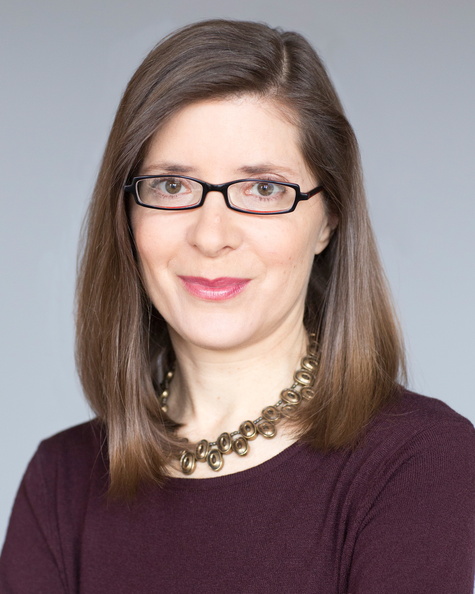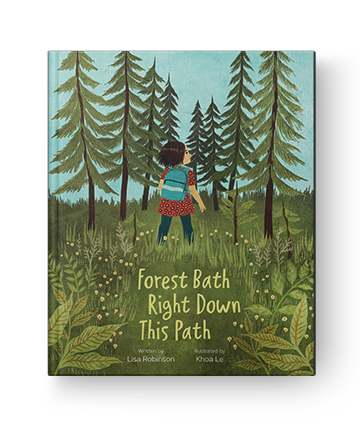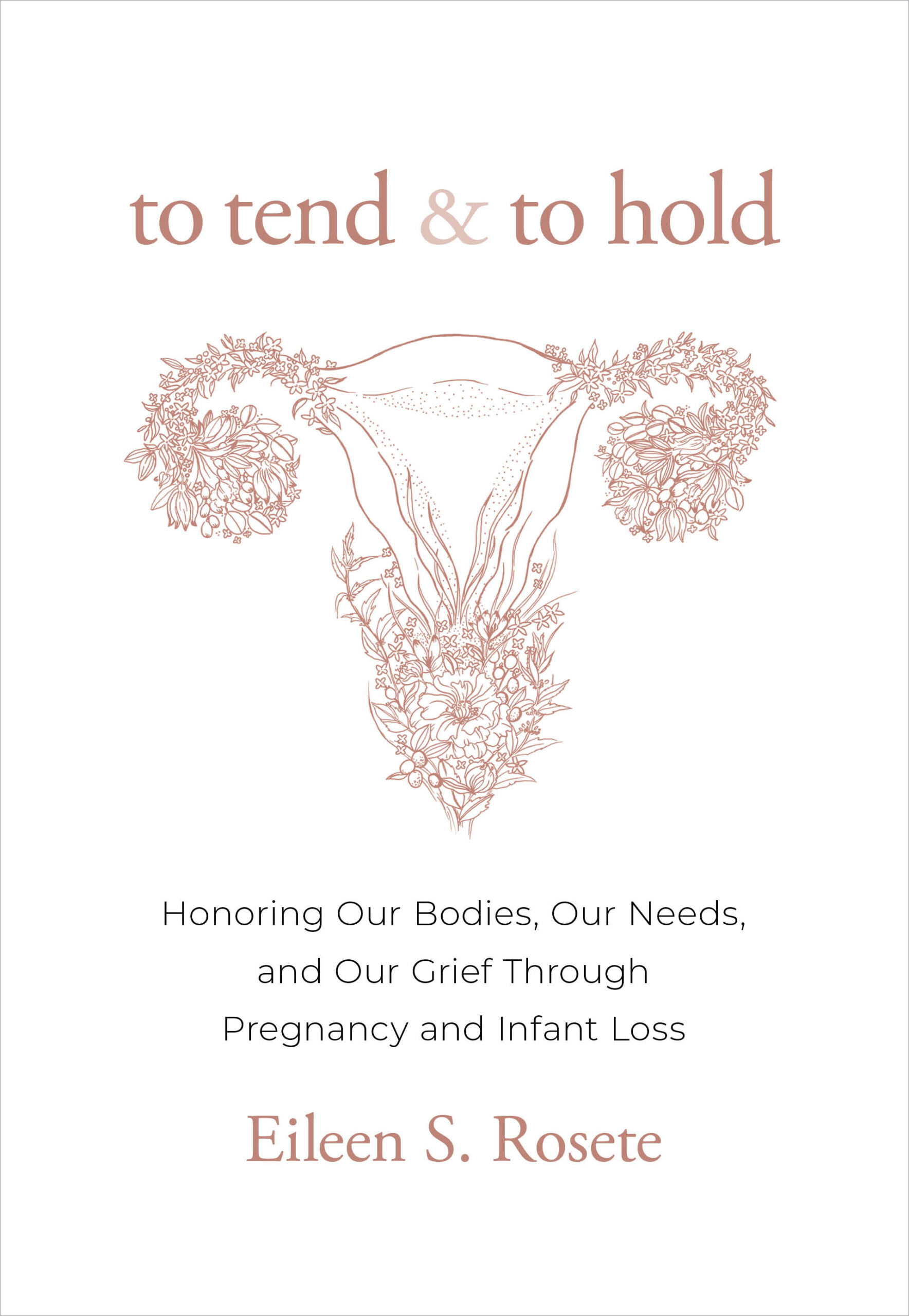
Lisa Robinson has a BA in psychology from Cornell University, an MD from Tufts University, and an MFA in Writing for Young People from Lesley University. She works as a therapist for children, teenagers, and adults, and is the author of numerous picture books. Lisa lives in Newton, Massachusetts. Learn more at author-lisa-robinson.com.
Author photo © Cheryl Clegg

As we wander the forest’s moss-lined paths, we smell pines and firs, touch bark and berries, and listen to birds and chipmunks. The hike ends at a rocky beach where we swim and explore tidepools. When we leave, we feel peaceful and calm. The name for this kind of soothing experience is forest bathing.

There’s evidence that smelling chemicals from trees called phytoncides and microbes from soil called mycobacterium vaccae may reduce stress and boost immune function.
I work as a child psychiatrist to help children, teens, and adults, and I’m always looking for ways to help people manage stress and anxiety. Some of the recommendations I make for doing this include exercise, taking time away from screens, meditating, and connecting with family and friends. I try to do these things myself, too! Every morning I take a half hour walk through the woods near my home.

I’m also a parent of two children (now young adults), and I’ve been concerned about the ways phones and screens are interfering with paying attention to the natural world as well as one another. It’s known that spending a lot of time on social media is contributing to the worsening of teens’ mental health. Adults need to take time away from their phones, too. That’s why the main character of my book, Kayla, encourages her father to put away his phone and fully engage in their walk through their forest. Children want their parents’ undivided attention; often they’re the ones encouraging adults to turn off their phones and be present.

I hope this book inspires you to spend time with your loved ones outdoors and soak in all its beauty and mental health benefits. Happy forest bathing!
Wishing you fresh air and sunshine,
Lisa Robinson
P.S. I invite you to download the free story time kit with five activities for children to learn more about forest bathing—from heading out on a sensory expedition to exploring their senses to making art in nature.

Lisa Robinson is a therapist, picture book writer, and nature enthusiast. She lives in Newton, Massachusetts. Every summer her family travels to coastal Maine for two weeks. The highlight of the trip is a walk through Barred Island Preserve on Deer Isle. The animals and plants mentioned in her new children’s book, Forest Bath Right Down This Path, are all found there. Learn more about Lisa and her work at author-lisa-robinson.com.

Learn More
Amazon | Barnes & Noble | Bookshop | Sounds True
With so many valid concerns stoking fear in today’s world, it’s no wonder that more and more of us are living in a state of chronic anxiety that seems irreversible. If you’re feeling at a loss about how to reclaim your peace of mind, body, and spirit, Sheryl Lisa Finn has a life-changing suggestion: Don’t underestimate the power of connection. In this podcast, Tami Simon speaks with the author of The Healing Anxiety Workbook to share actionable insights and approaches for dissolving anxiety on the spot and experiencing inner safety and serenity (without “bypassing” the realities of our times).
Enjoy this conversation on: anxiety in a nutshell—sensing a lack of safety; reverse engineering anxiety; working with trauma at the root; when anxiety seeps back in; finding a source of goodness bigger than yourself; grief; building a foundation of connectivity that we can source into in challenging times; creativity and working with our hands; receiving support from the “wise self” within; Jungian psychology, archetypes, and dreamwork; fighting the spiritual fight in the face of systemic problems; anxiety’s hidden agenda—to serve our evolution; a practice to release the anxiety-producing stories we tell ourselves; the power of ritual and the importance of getting out of our rational minds; the practice of asking your ancestors to take your worry from you; anxiety in relationships, and how connection becomes a remedy; panic attacks; anxiety as a friend in disguise; and more.
Note: This episode originally aired on Sounds True One, where these special episodes of Insights at the Edge are available to watch live on video and with exclusive access to Q&As with our guests. Learn more at join.soundstrue.com.
An Excerpt From To Tend And To Hold: Honoring Our Bodies, Our Needs, and Our Grief Through Pregnancy and Infant Loss
For as long as there has been life, there has been death. For as long as we have birthed life, we have also birthed death. What you feel has been felt since time immemorial, and it has been felt by many, though womb loss is still not widely known or acknowledged. Consider that even in the most optimal conditions, there is only a 30 to 40 percent chance that a clinically recognized pregnancy will occur in a given menstrual cycle, and only about 30 percent of conceived pregnancies progress to live birth.1 Globally, approximately one in four pregnancies end in miscarriage and 2.6 million pregnancies end in stillbirth.2 In 2022, 2.3 million newborns died in the first month of life,3 and approximately 73 million induced abortions occur every year.4 Womb loss in and after pregnancy is, in fact, a common and regular occurrence, though many of us may struggle with feelings of inadequacy and shame as if such loss is atypical and we are deserving of blame. The prevailing stigma surrounding womb loss makes enduring it all the more challenging as we may feel reluctant to reach out for support and hold on to harmful ideas about our worth. You are not alone, nor are you any less precious and deserving of support. You are not alone as the anguish of womb loss has been felt, is being felt at this very moment, and will continue to be felt the world over.
Before we go any further, let us reconnect with our breath. It can be hard to breathe if you’ve recently learned about your womb loss or impending loss and feel pressure to make decisions right away. Or if you have learned of the potential for a loss and have to endure a waiting period before you know for certain. It can be hard to breathe even as you process a loss long since passed. The following practice is an invitation to make the resilient choice to slow down and allow yourself a moment to breathe. So that you can feel grounded. So that you can have the capacity to be present to your grief. So that you can tend to your needs.
GROUNDING BREATHING PRACTICE
The Invitation
When you are ready, take three deep breaths at your own pace and in your own way. You might inhale and exhale through the nose or inhale through the nose and exhale audibly through the mouth. You might close your eyes or soften your gaze as you do so, allowing your awareness to gently follow each breath, letting everything else fade to the background. You might even think the following words as you breathe, allowing them to help you feel grounded in this moment.
Inhale. Exhale. One.
Inhale. Exhale. Two.
Inhale. Exhale. Two.
Your body may want to continue breathing this way, or it may feel like this was enough. Honor what feels right for you.
Sometimes breathing is the most we can bring ourselves to do, the best we can do, when our whole being is overcome. Deciding what comes next may feel like too much to ask of ourselves. If so, breathe, and trust that it is enough for this moment.

Eileen Santos Rosete, MSMFT, PCD(DONA), CYT 200, holds a master of science in marriage and family therapy from Northwestern University and is certified as a DONA International postpartum doula, trauma-informed yoga teacher, and grief educator. Her brand, Our Sacred Women®, is known for its elevated offerings that help women feel seen, held, and honored. She is especially passionate about supporting all who give birth and are postpartum both after live births and after loss. To learn more, visit eileensantosrosete.com.

Learn More
Amazon | Barnes & Noble | Bookshop | Sounds True
The realities of human-driven climate change are only just starting to hit home for many of us. Meanwhile, activists like Paul Hawken—along with the people who have endured the devastating impacts of environmental degradation in the places they call home—continue to raise the alarm for a planet in peril. In this podcast, Tami Simon speaks with the renowned environmentalist and entrepreneur about his latest work, Carbon: The Book of Life, an awe-inspiring read that Tami dubs “a love letter to the flow of life.”
Give a listen to their conversation on: why the climate is never really in crisis (and who is); the narratives of disconnection that perpetuate a sense of separation from life; why “the only way forward is regeneration”; how humanity’s “othering” in order to get ahead just puts us all behind; the concept of flow in the natural world; the extraordinary complexity of life and the trillions of creatures communicating with each other every day; tapping into the power of curiosity and wonder; overcoming the overwhelming inertia of the existing capitalist system; why our grief is a measure of our love; embodying the timeless qualities of compassion, cooperation, and respect; the connection between the loss of Indigenous languages and species loss; apocalypse—the revelation of that which is hidden; how the discovery of fire impacted human evolution; mystical experiences in nature; leadership—listening to all the voices; and more.
Note: This episode originally aired on Sounds True One, where these special episodes of Insights at the Edge are available to watch live on video and with exclusive access to Q&As with our guests. Learn more at join.soundstrue.com.
© 2024 Sounds True. All rights reserved.